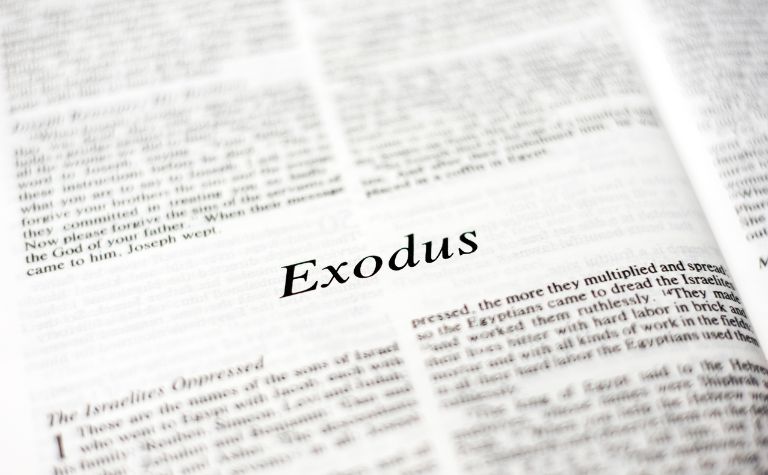Aaron is an important figure in the Bible, especially in the books of Exodus, Leviticus, and Numbers. The Old Testament mentions him over 350 times. The New Testament refers to him five times. Aaron played a significant role in God’s work in Israel during his lifetime. Sadly, he also made big mistakes. So who was Aaron?
Aaron is mostly known for being Moses’ brother, yet God also called him to serve as Israel’s first high priest. In his lifetime, Aaron was a part of some of Israel’s greatest successes, like defeating the Amalekites. He was also part of some of its biggest failures, like creating a golden calf idol.
How does Aaron help Moses before the exodus? How did he help Israel win the battle against the Amalekites? How did Aaron drastically fail when Moses was on Mount Sinai? How did he and Miriam sin against their brother? Where does the New Testament mention Aaron? Keep reading to learn the answers to these questions and others.
Also, see Who Was Asaph in the Bible? to learn more.

Aaron’s Life Before and After Israel’s Exodus from Egypt
Aaron was the firstborn son of Amram and Jochebed, who belonged to the tribe of Levi (Num. 26:59). His mother gave birth to him in Egypt during Israel’s captivity. Aaron’s brother was Moses (Exod. 4:14), and his sister was Miriam (Exod. 15:20).
Aaron was three years older than Moses (cf. Exod. 7:7). His wife was Elisheba, and together they had four sons: Nadab, Abihu, Eleazar, and Ithamar (Exod. 6:23).
Aaron’s life before the exodus from Egypt
The Bible doesn’t say much about Aaron’s early life. However, he first appears in Exodus after Moses protested God’s call to confront Pharaoh, saying that he didn’t have the speaking ability that his brother Aaron did.
“Is there not Aaron, your brother, the Levite?” God said to Moses. “I know that he can speak well. Behold, he is coming out to meet you, and when he sees you, he will be glad in his heart” (ESV).
When it’s time for Moses to confront the Pharaoh as God’s spokesman and tell him to let the Israelites go, Aaron is with him. Moses was 80 years old, and Aaron was 83 at the time (Exod. 7:7).
In one scene, Aaron threw down his staff in front of Pharaoh, and it became a serpent. When the Egyptian magicians duplicated the miracle, Aaron’s serpent swallowed theirs (Exod. 7:10-13).
Aaron’s life after the exodus from Egypt
After God sent the ten plagues on Egypt and Pharaoh let the Israelites go, they entered the wilderness, where they would wander for 40 years, experiencing several significant challenges.
Toward the beginning of their journey, the Amalekites attacked them. Moses called on the military leadership of Joshua to win the victory, but Aaron and Hur, another leader in Israel, also played important roles.
During the battle with the Amalekites, the Israelites had success when Moses raised his staff, and when he lowered it due to fatigue, they didn’t. This happened because the staff symbolized God’s power.
Moses holding it high in the air was a visual demonstration of asking God for help and success. So how would Israel win the battle if Moses couldn’t physically hold up his arms?
Aaron and Hur were the solutions to the problem.
Exodus 17:12 reads, “But Moses’ hands grew weary, so they took a stone and put it under him, and he sat on it, while Aaron and Hur held up his hands, one on one side, and the other on the other side. So his hands were steady until the going down of the sun” (ESV).
As a result, Joshua and the Israelites overpowered the Amalekites (Exod. 17:13).
Also, see Who Was Lot in the Bible? to learn more.

What is Aaron known for in the Bible?
Like other figures in the Bible, including Noah, Moses, David, and Peter, Aaron is known for times of faithful obedience and moments of devastating failure.
Aaron was Israel’s first high priest
Aaron was the first high priest Israel ever had. He was the first to wear the high priests’ garments (Exod. 28) and the first to be consecrated to the office (Exod. 29).
Aaron was the first leader of Israel’s sacrificial system (Lev. 1-7). But, even though he was a high priest, he wasn’t sinless. Aaron established and led the sacrificial system for others, yet he also made sacrifices for himself (Lev. 16:11).
During Aaron’s tenure as high priest, a tragic incident occurred that directly affected Aaron’s family. After incorrectly, and perhaps flippantly, performing a sacrifice, two of Aaron’s sons, Nadab and Abihu, died as a punishment from God (Lev. 10:1-3). God didn’t allow Aaron to ritually mourn for his sons (Lev. 10:4-7).
Aaron and Miriam grumbled against Moses
In an unflattering scene, Aaron and Miriam grumbled against Moses because he married a Cushite woman (Num. 12:1). They challenged his leadership and sought power for themselves (v. 2).
Perhaps Aaron and Miriam thought they were just criticizing their brother. However, what they were actually doing, was grumbling against God’s appointed leader.
When God came down to confront the siblings, he asked them why they thought they could speak against Moses as they did (v. 8). “And the anger of the LORD was kindled against them, and he departed” (v. 9).
Suddenly, Miriam turned leprous. Then Aaron confessed to God that they had acted foolishly and asked for forgiveness (v. 11-12). Moses also asked God to heal his sister (v. 13), which he did (v. 14-15).
Also, see Who Is God in the Bible? to learn more.

Aaron led the creation of the golden calf idol
After the exodus, Aaron oversaw one of the worst moments in Israel’s history when God’s people, having just been redeemed from slavery in Egypt, turned to idolatry.
The Israelites became impatient when Moses was on Mount Sinai receiving the Law from God. So they said to Aaron, “make us gods who shall go before us. As for this Moses, the man who brought us up out of the land of Egypt, we do not know what has become of him” (Exod. 32:1).
Rather than respond with righteous leadership, Aaron succumbed to their requests. He collected all the gold jewelry the people had, melted it, and fashioned an idol in the shape of a calf.
Aaron “received the gold from their hand and fashioned it with a graving tool and made a golden calf. And they said, ‘These are your gods, O Israel, who brought you up out of the land of Egypt!'” (Exod. 32:4).
When Moses came down from the mountain and back to the camp, he saw the Israelites dancing around the golden calf, worshipping it.
He was furious. “He threw the tablets out of his hands and broke them at the foot of the mountain. He took the calf that they had made and burned it with fire and ground it to powder and scattered it on the water and made the people of Israel drink it” (Exod. 32:19-20).
As a result of the idolatry, God’s promises to Israel for land, a nation, and blessing (cf. Gen. 12:1-3) remained intact. However, their disobedience wouldn’t go unpunished. Exodus 32:25 concludes the scene: “Then the Lord sent a plague on the people, because they made the calf, the one that Aaron made.”
Aaron is mentioned five times in the New Testament
- Luke 1:5, “In the days of Herod, king of Judea, there was a priest named Zechariah, of the division of Abijah. And he had a wife from the daughters of Aaron, and her name was Elizabeth.”
- Acts 7:39-40a, “Our fathers refused to obey him, but thrust him aside, and in their hearts they turned to Egypt, saying to Aaron, ‘Make for us gods who will go before us.”
- Hebrews 5:4, “And no one takes this honor for himself, but only when called by God, just as Aaron was.”
- Hebrews 7:11, “Now if perfection had been attainable through the Levitical priesthood (for under it the people received the law), what further need would there have been for another priest to arise after the order of Melchizedek, rather than one named after the order of Aaron?”
- Hebrews 9:3-4, “Behind the second curtain was a second sectionc called the Most Holy Place, having the golden altar of incense and the ark of the covenant covered on all sides with gold, in which was a golden urn holding the manna, and Aaron’s staff that budded, and the tablets of the covenant.
Also, see What Is Zion In the Bible? to learn more.
References:
[1] Source
[2] Source
Related Questions
Regular Bible reading is a valuable habit, as Scripture is God's message to people. However, the Bible's 66 distinct books, featuring various authors, settings, and themes, can make it challenging...
There are 66 individual books in the Bible. There are 39 in the Old Testament and 27 in the New Testament. Many readers can read the shortest books in the Bible in 5 to 10 minutes. The longest book...
